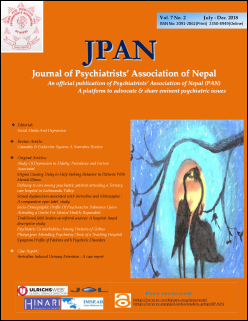Traditional faith healers as referral sources: A hospital-based descriptive study
DOI:
https://doi.org/10.3126/jpan.v7i2.24614Keywords:
Mental disorder, Faith Healers, Female, NeuroticAbstract
Introduction: Mental illnesses are commonly linked with a higher disability and burden of disease than many physical illnesses. But despite that fact, it is a general observation that a majority of patients with mental disorder never seek professional help. To elaborate further, the widely prevalent magico-religious beliefs associated with mental illness and lower literacy, poses significant social obstacles in seeking appropriate health care for psychiatric patients. In general, mental illness is seen as related to life stresses, social or family conflicts and evil spirits and the concept of biological causes of mental illness is rare even among the educated. The idea that illness and death are due to malevolent spirits is common notion that is shared practically by all level of society from the so-called primitive to modern industrialized societies, thus indicating the strong influences of cultural background. When there is a magico- religious concepts of disease causation, there is tendency to consult indigenous healers. Therefore, the patients with mental illness often either visit or are taken to faith healers by their relatives. The objective of the study was to determine the various psychiatric cases that were referred by the traditional faith healers to the authors.
Material and Method: This is a cross- sectional, hospital- based descriptive study, conducted at the Psychiatric outpatient department of Pokhara Om Hospital, Pokhara, Kaski, Nepal for the period of one year, from June 2016 to May 2017. The total of 35 cases, referred by the traditional faith healers was included in the study. Subjects of any age, any gender, any literacy level, any caste, from any locality and religious background were included in the study after their consent. Subjects who refused to consent were not included in the study. The psychiatric diagnosis was based on the complete history and examination and ICD- 10 DRC criteria.
Results: Though the sample size is small, it is interesting to note that patients with various kinds of mental disorders were referred by traditional faith healers. There were patients suffering from neurotic disorders, psychotic disorders, mood disorders, seizure, substance use disorder, intellectual disability etc seeking the treatment from traditional faith healers. Among the cases referred, predominantly were female and neurotic cases. Most patients were educated.
Conclusion: The study shows that patients with various mental disorders visit traditional faith healer. This area surely requires further in-depth look as traditional faith healers can be an important source of referral of psychiatric patients.
Downloads
Downloads
Published
How to Cite
Issue
Section
License
This license enables reusers to distribute, remix, adapt, and build upon the material in any medium or format, so long as attribution is given to the creator. The license allows for commercial use.




